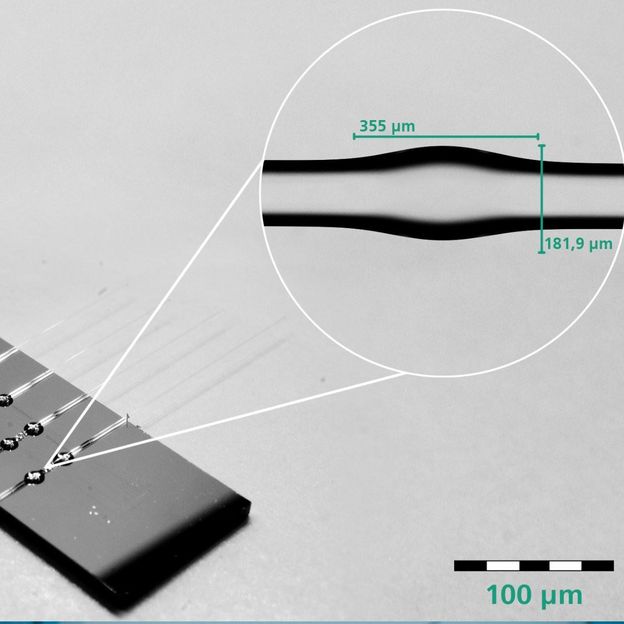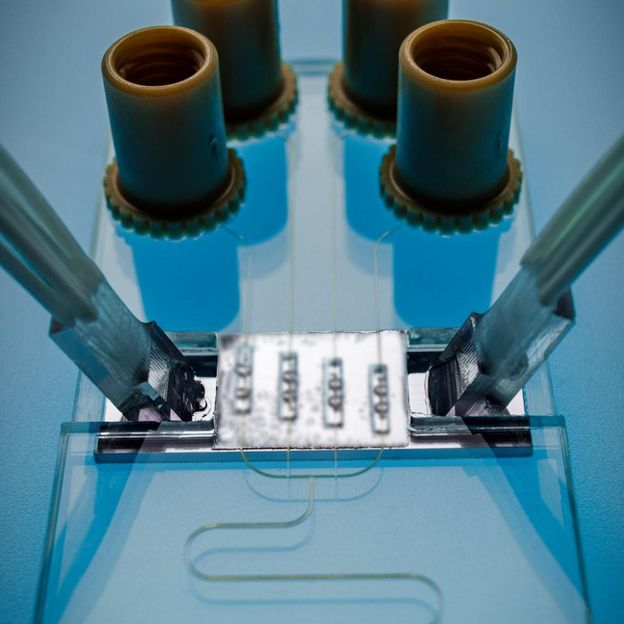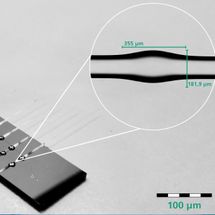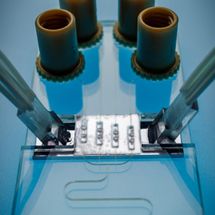Point-of-care diagnostics for multiple diseases, courtesy of photonics technology
New generation of diagnostic systems
COVID 19 has turned PCR and other antigen tests from tools known only to medical professionals into an everyday experience for all of us. To mark the successful completion of their research on the PoC-BoSens platform, the project consortium led by Fraunhofer IZM can announce the birth of a new generation of such diagnostic systems: a photonic platform for precise point-of-care diagnostics. The core of the platform is an automated analytical system based on tiny optical fiber structures that ensures extremely precise and simultaneous measurements with up to six sensing channels. This means a much faster detection and treatment of infectious diseases like tuberculosis or Q fever.

Photonic chip with four bottle microresonators
© Fraunhofer IZM

Optofluidic cartridge for detection of cytokines
© Fraunhofer IZM | Volker Mai


The COVID 19 pandemic has been a stark wake-up call for the world to realize the immense importance of fast, affordable and, crucially, scalable ways to diagnose and monitor infectious diseases. Whether it is the sudden arrival of new and unknown viruses or the long-haul fight against diseases that have plagued the world for decades, it is often the lack of effective and immediately available diagnostic tools that leads to millions of preventable deaths year on year. By contrast to other diagnostic technologies that may be too expensive, unreliable, or simply too unwieldy for use in the field, photonic sensor platforms represent a revolution for point-of-care diagnostics. Highly sensitive, compact, and multiplex-capable, they promise to enable the fast and reliable detection of infectious diseases.
As the coordinating institute of the PoC-BoSense project, Fraunhofer IZM has assembled an international consortium of researchers working on photonics, microfluidics, biochemistry, electronics, and biomedicine. Their mission: To develop an optofluidic diagnostic system to work at the point of care. The system processes cell-based samples by quantifying the biomarkers for a number of infectious diseases in less than 15 minutes. After much complex and innovative work, Dr. Alethea Vanessa Zamora Gómez, project coordinator at the Fraunhofer Institute for Reliability and Microintegration IZM, can report the project’s successful conclusion: “We have reached our objectives and are already working with our partners on follow-up projects for the final integration and qualification of our prototype components. We are working to get the platform ready for commercial use, which includes scaling up the optofluidic cartridge and reader unit, conducting clinical tests, and qualifying for CE classification.”
The innovative PoC-BoSens platform is made possible by a world-first combination of novel photonic bottle microresonators with a microfluidic system to channel the samples. Bottle microresonators are part of a class of photonic structures that combines exceptional sensitivity with a very compact design. This makes them a perfect choice for the fast multiplex detection of specific molecules as happens in PoC diagnostics. What has long stood in the way of the technology’s use in these applications was the lack of suitable integration solutions for bottle resonators or other three-dimensional optical microresonators.
Zamora Gómez and her team at Fraunhofer IZM were determined to overcome this impasse: Their biosensor prototype represents the first successful integration of four bottle microresonators in a practical cartridge. Using the semi-automated tools available in the labs of Fraunhofer IZM, the microscopically small structures could be placed on a photonic chip, an operation that demanded extreme precision at a scale of less than a single micrometer. The hybrid photonic chip was then coupled with a microfluidic chip in a combined optofluidic design that is ideal for multiplex molecule detection. Nobody had dared to try this complete integration of an array of bottle microresonators on a chip before due to the sheer complexity of the operation, but the Fraunhofer IZM project team was not daunted by the challenge. Their determination paid off, as their chip design could be assembled with a readout system to become the PoC-BoSens platform and analyze cytokine molecules. Cytokines are a group of proteins that play an important role in the human immune system and certain infectious diseases like tuberculosis or Q fever. They coordinate the body’s fight against these pathogens and are important for a successful immune response. The PoC-BoSens platform can also be used to test for antibodies that need to be identified and diagnosed quickly in certain medical conditions like celiac disease.
See the theme worlds for related content
Topic World PCR
This groundbreaking and highly versatile molecular technique of PCR allows us to amplify tiny amounts of genetic material on a large scale and analyze them in detail. Whether in medical diagnostics, forensic DNA analysis or research into genetic diseases - PCR is an indispensable tool that gives us deep insights into the world of DNA. Immerse yourself in the fascinating world of the polymerase chain reaction (PCR)!

Topic World PCR
This groundbreaking and highly versatile molecular technique of PCR allows us to amplify tiny amounts of genetic material on a large scale and analyze them in detail. Whether in medical diagnostics, forensic DNA analysis or research into genetic diseases - PCR is an indispensable tool that gives us deep insights into the world of DNA. Immerse yourself in the fascinating world of the polymerase chain reaction (PCR)!























































